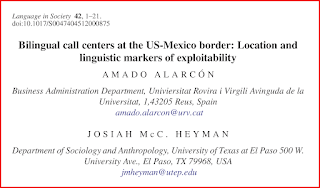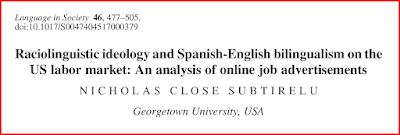RACIOLINGUISTICS
Follow me down the rabbit hole...
I had to read a peer-reviewed linguistic research paper for my Introduction to Language Arts class.Oh holy buckets, that was NOT easy reading!
I consider myself a smart enough and well-read person. But the word "raciolinguistic" was all over this paper. It was easy enough to determine that this was a combination of the words "race" and "linguistic". But I wanted to know more.
(From the image above) A raciolinguistic perspective seeks to understand the interplay of language and race within the historical production of nation-state/colonial governmentality, and the ways that colonial distinctions within and between nation-state borders continue to shape contemporary linguistic and racial formations. (From: Language in Society, Volume 46 - November 2017. copyright © Cambridge University)
Mike Mena, of "The Social Life of Language," broke down the ideologies from a paper written by Flores & Rosa, "Undoing appropriateness: Raciolinguistic ideologies and language diversity in Education" that was cited multiple times in the research paper I read by Subtirelu. Follow all these hops? The rabbit took me from one paper, to another paper, to Google, to YouTube. Here, I was able to learn more about the word RACIOLINGUISTIC and how the ideology worked in both of the papers that started this rabbit hole adventure.
I attempted to read the entire paper. I highlighted things. I tried to make sense of all the data. I read the paper, and re-read the paper, multiple times.
And...because I'm extra...I also downloaded the other paper we could read for the same assignment. I only HAD to read one. But I figured I'd read the second one as well in case it was easier...or something.
I consider myself a smart enough and well-read person. But the word "raciolinguistic" was all over this paper. It was easy enough to determine that this was a combination of the words "race" and "linguistic". But I wanted to know more.
I googled the word.
(From the image above) A raciolinguistic perspective seeks to understand the interplay of language and race within the historical production of nation-state/colonial governmentality, and the ways that colonial distinctions within and between nation-state borders continue to shape contemporary linguistic and racial formations. (From: Language in Society, Volume 46 - November 2017. copyright © Cambridge University)
I wanted to learn more. I ended up on YouTube.
Mike Mena, of "The Social Life of Language," broke down the ideologies from a paper written by Flores & Rosa, "Undoing appropriateness: Raciolinguistic ideologies and language diversity in Education" that was cited multiple times in the research paper I read by Subtirelu. Follow all these hops? The rabbit took me from one paper, to another paper, to Google, to YouTube. Here, I was able to learn more about the word RACIOLINGUISTIC and how the ideology worked in both of the papers that started this rabbit hole adventure.
I was able to follow Mena's explanation perfectly. He made so many points that seriously got me thinking about race and language.
Language affects our perception of race.
Race affects our perception of language.
Mena went on to say that the ideologies of language and the ideologies of race have an overlap. He made four main points:
- There are ideas and representations about groups of languages -- or -- races.
- These ideas produce the "Nature" of X (X = these languages or races). They end up determining what we deem as "normal".
- Group X (the language or race that is "normal") uses these ideas of "normal" to protect their own interests.
- All of these ideas of language -- or race -- emerge from history.
Because the first two papers that started this rabbit hole adventure were about English speakers and Hispanics, I wound Mena's points around in my brain and applied his thoughts to those papers. I then extrapolated:
- There are ideas, based on historical events, that determine things about Whites and Hispanics. There are ideas, based on historical events, that determine things about English speakers and Spanish speakers.
- These ideas produce what we (society) deem as "normal" or accepted. There are things we expect from native English speakers and things we expect from Hispanics that speak only Spanish or are bilingual with English.
- Language does not exist on its own. Language has individuals that speak. A "perfect speaker" does not exist...however, one has been legitimatized. And, ultimately, this "perfect speaker" is based on a White listener due to the imbalance of racial equity that exists.
- White, native speakers of English do what they do to perpetuate this situation because that is the nature of what is "normal" and is possible due to the power imbalances that exist.
I don't have any major - deep - takeaway from all of this. I imagine my dive down the rabbit hole could go on forever. But learning how the overlap of language and race and perception is all intertwined was very interesting to me.
Works cited:
"Flores and Rosa - 'Undoing Appriopriateness: Raciolinguistic Ideologies...' (2015)" YouTube, uploaded by Mike Mena, 31 Jan. 2019, https://www.youtube.com/watch?v=5oPWMEJjGbk. Accessed 26 Sept. 2022.






Comments
Post a Comment